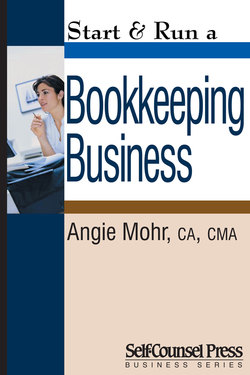Читать книгу Start & Run a Bookkeeping Business - Angie Mohr - Страница 23
Start-Up Costs
ОглавлениеAs part of your initial business plan, it’s critical that you outline your costs on start-up carefully and ensure that you account for all of the potential costs. You may forget seemingly insignificant things that can add up to a lot of additional cash you weren’t planning to spend. Typical start-up costs for a bookkeeping practice include the following:
• Supplies. You may not think things such as pens, paper, and file folders are significant, but the initial cost of stocking your office can be high.
• Rental deposits. You may have to pay a deposit on your rented locations or on any rented office equipment.
• Capital equipment. You won’t need any kind of specialized machinery to run your bookkeeping practice, but you will need the basics: a computer, printer, photocopier, fax machine, office furniture, and perhaps a vehicle for your business.
• Insurance premiums. Although you may pay monthly premiums in the future for liability or business insurance, your carrier may require that you pay the first year up front.
• Professional fees. Chapter 1 discussed the importance of putting together your team of external advisers right from the start. This entails incurring at least legal and accounting fees to set up your business and also to retain advice on planning and strategizing.
• Renovation costs. If you’re renting office space or converting a room in your house into your office, you may need to redesign and decorate that space. Costs can include paying a design consultant as well as expenses such as carpentry, painting, carpeting, and sound systems.
• Delay costs. It is always valuable to factor delay costs into your calculations. Start by asking yourself what costs you will still be incurring even if you aren’t able to open your doors on time because of some unforeseen event. If you have hired an employee, for example, you may have to start paying that person when the contract starts, regardless of your delayed opening date.
Once you have tallied all of your expected start-up expenses, make sure you leave yourself some breathing room. Overestimate your start-up expenses by 5 to 10 percent of your total expected costs to make sure you will survive an initial cost overrun.
